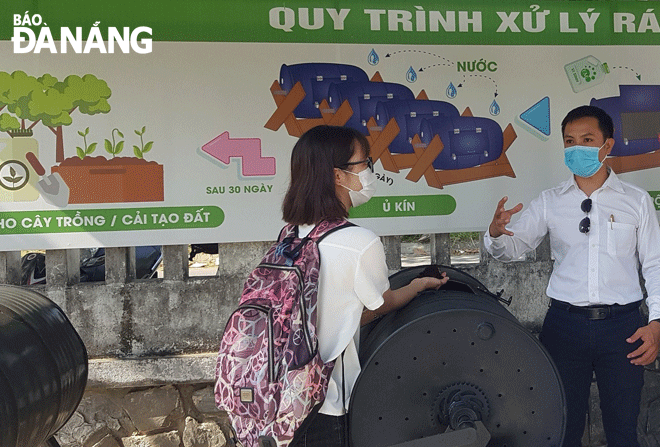Da Nang students create organic waste processing device for schools
In their efforts to meet urgent need for organic waste treatment in schools, a group of students and lecturers from the Da Nang University of Technology and Education have successfully designed and created an organic waste treatment system in schools with the use of the In-Vessel composting. The low-cost and environmentally friendly system is suitable for use in schools and urban residential areas as it is odourless and easy to use .
 |
| Dr. Pham Phu Song Toan (right), an environmental scientist, founder of the COM-UTE-V2 system and leader of the research group and student Tran Truong Hoang Vy, a member of the inventor team introducing the composting process in the Tran Dai Nghia Primary School in Cam Le District. |
Having passed a one-year test run, the research group launched the COM-UTE vessel composting version 2.0 system, or the COM-UTE-V2 system which is the first ever locally- made organic waste treatment system in Central Viet Nam to be used in schools for recycling daily kitchen waste into compost.
In-vessel composting technology is an advanced and robust system that ensures maximum process efficiency and minimal emissions. The system ensures that composting takes place in an enclosed environment, with accurate temperature control and monitoring. Composting is an effective method for potentially solving the problem by converting organic waste into valuable compost when compared to conventional methods in terms of process parameters and efficiency. In-vessel composting involves the use of naturally occurring aerobic processes which break down organic matter to produce an organic material suitable for use as a soil conditioner, and a source of nutrients in agriculture. Thanks to locally-made organic waste processing device, organic waste will be diverted away from landfill in a bid to lift local recycling rates while converting the waste into soil conditioners as well as using it to restore landfill sites. This naturally benefits the environment. The device can be used effectively for shool microwaste management and composting is a good option for managing school waste.
The organic waste treatment system has 4 modules taking turns and operating continuously. The manually-operated device is easy to use while its operating costs are very low with an estimated amount of VND 20,000 – VND 30,000 a month, including costs of electricity usage and microbial inoculants.
The manual version has been tested in a one-year pilot project at the university. It has two successful advantages namely quick disintegration and non-smell.
Thermal aerobic microorganism which is a key brain factor of the biodecomposition system to be used to let disintegration process go faster in temperature of 60 or 70 degrees Celsius.
The COM-UTE-V2 system is a comfortable model in terms of time, design and control.
A cutting machine is used to chop waste before mixing it with saw dust and aerobic microorganism in rotary drums for decomposing. The mixture needs spinning every two days for the thermal aerobic microorganism to work well. Aerobic microorganism decomposes completely organic waste within 30 days that are shorter than natural disintegration from 35 to 50 days. No bad smells or leaks were released during the process. Two thirds of processed compost will be taken out for use, while the remaining will be reserved for new waste treatment. It means that the system will not need supplemental aerobic microorganism.
Tran Truong Hoang Vy, a final year student from the Faculty of Chemical Technology and Environment at the Da Nang University of Technology and Education said that their invention has participated in the ‘Optimal Management of School Waste’ Project in the Tran Dai Nghia Primary School in Cam Le District that was funded by the East Meets West Foundation (EMWF).
The Tran Dai Nghia Primary School is the first one in Da Nang to use the organic waste treatment system under the piloted Waste-Free Schools model of the Building Healthy City (BHC) programme which is one of EMWF 's key programmes in building a healthy and clean study environment for school students in the city.
“Daily 10kg leftover food, which used to be disposed of, now helps the school’s kitchen earn at least 5kg of compost each day. No smells or pollutant come out from the process. The system helps the school’s students learn onsite classification of solid wastes as well as composting and recycling these wastes as a source of plant nutrients and improves soil properties" said the school’s principal, Truong Thi Bich Thuy.
She also remarked that the system has helped the school reduce 60 per cent of waste released each month, saving VND1 million in waste treatment costs while producing 100kg of nutritional compost each month.
Dr. Pham Phu Song Toan said it has now been over two years since the start of the group’s research, the system currently operates smoothly with enhanced treatment solutions in an attempt to reduce solid waste as well as reduce the harmful effects and find ways for their utilization, contributing to environmental protection.
“This system has won the first prize in the Zero Waste Program launched by the Viet Nam Zero Waste Alliance (VZWA), and it has been named among the top 10 student tech startups at the University of Da Nang for 2022. In the future, we hope to expand the use of our system into hotels, restaurants and households across the city”, said Dr. Pham Phu Song Toan.
Reporting by HUYNH TUONG VY – Translating by H.L